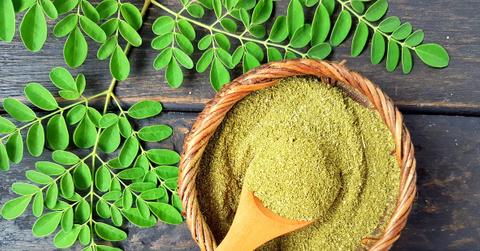Curious About Moringa? Here Are The Surprising Health Benefits
Moringa, also known as the "tree of life," is a plant that has been praised for its health benefits in Asia and Africa for centuries. Today, it's is available in supplement form, and boasts a host of surprising health benefits.
Updated May 24 2019, 2:20 p.m. ET
If you've been to a health foods store lately or scrolled through food blogs looking for recipe ideas, you might have seen Moringa popping up more often. Sometimes called the "horseradish tree" or the "tree of life," moringa is a green, flowering, drought-resistant tree native to the Indian subcontinent. Though the entire tree can be used as ingredients for traditional herbal medicines, the leaves are more commonly consumed.
The powerful plant is quickly becoming everyone's favorite new go to superfood and for good reason - it's filled with antioxidants and bioactive plant compounds and packs a powerful punch of health benefits. Though it's still largely unknown in the Western world, you can find moringa in powder form, making it easy to sprinkle on your salads or add to your morning smoothie. Let's take a look at a few science-backed reasons for what makes this plant so great.
Fights inflammation
According to a study conducted by the Department of Plant Biology & Pathology at the State University of New Jersey, moringa has been found to "alleviate low-grade inflammation associated with chronic diseases." Because inflammation is a common symptom of so many chronic diseases, moringa supplements can serve as an effective tool for those with arthritis, inflammatory bowel disease, and other conditions. Inflammation can also lead to unnecessary pain and pressure after injuries, which means that anti-inflammatory medicines or supplements, like moringa, can be used for low-grade pain relief.
Excellent nutritional support
Whether eaten raw or ingested in powdered supplement form, moringa is a nutrient-dense food, rich in vitamins and minerals. According to the United States Department of Agriculture (USDA), 100 grams of moringa contains 9 grams of protein, 51.7 milligrams of Vitamin C, and 185 milligrams of Calcium. Thus, mixing moringa powder into a morning cup of tea or even water can get your day off to a nutritious start.
Promotes liver health
Our livers are responsible for filtering toxins from our blood--a very important task. To keep our livers healthy, it's vital that we maintain healthy levels of liver enzymes. Moringa can help with that task. In fact, according to a study conducted by the College of Pharmacy at King Saud University, moringa oil has been shown to restore liver enzymes to healthy levels in rats. The study stated that moringa's liver-protecting effects "may be due to free radical scavenging potential caused by the presence of antioxidant component(s) in the oil."
In other words, the fact that moringa is high in antioxidants is good news not only because antioxidants are known to decrease the potential risk of cancer, but also because they promote the growth of healthy liver enzymes.
Makes great brain food
Another benefit of moringa's antioxidant properties? They're good for the brain! Besides helping to prevent brain cancer, antioxidants can improve mood and overall brain function by reducing oxidation in brain cells. A study by the Garden City Group of Institutions found that moringa had positive preliminary results when used as a supplemental treatment for Alzheimer's Disease. The reduction of oxidation in the brain also means that moringa can help to prevent dementia and improve overall memory retention.
